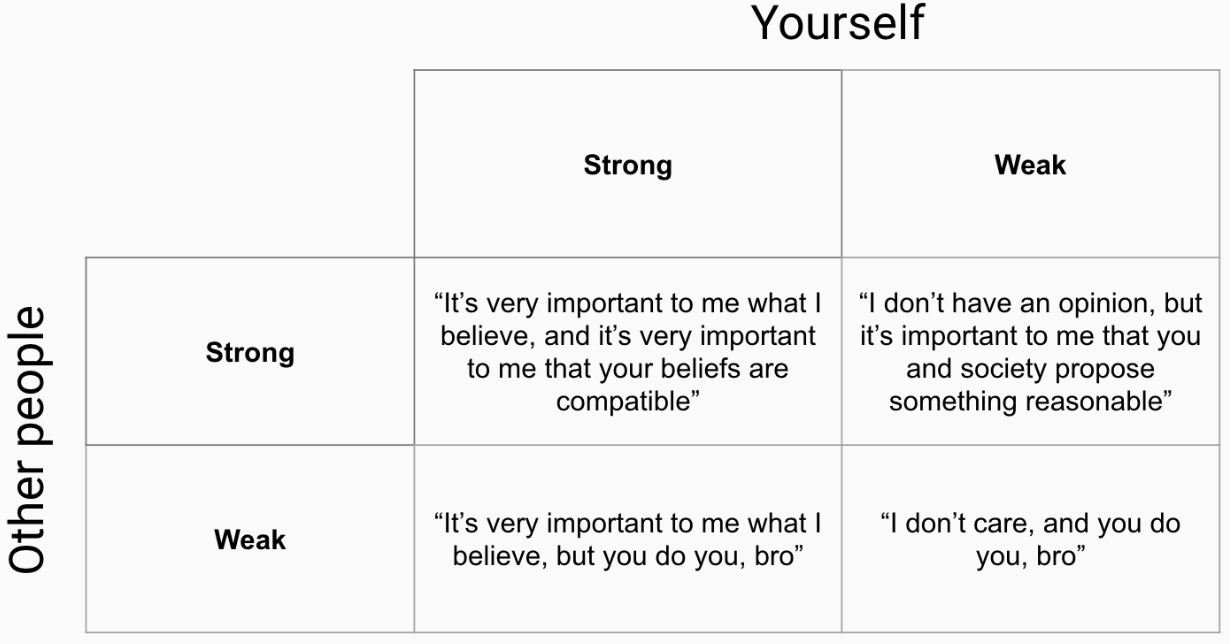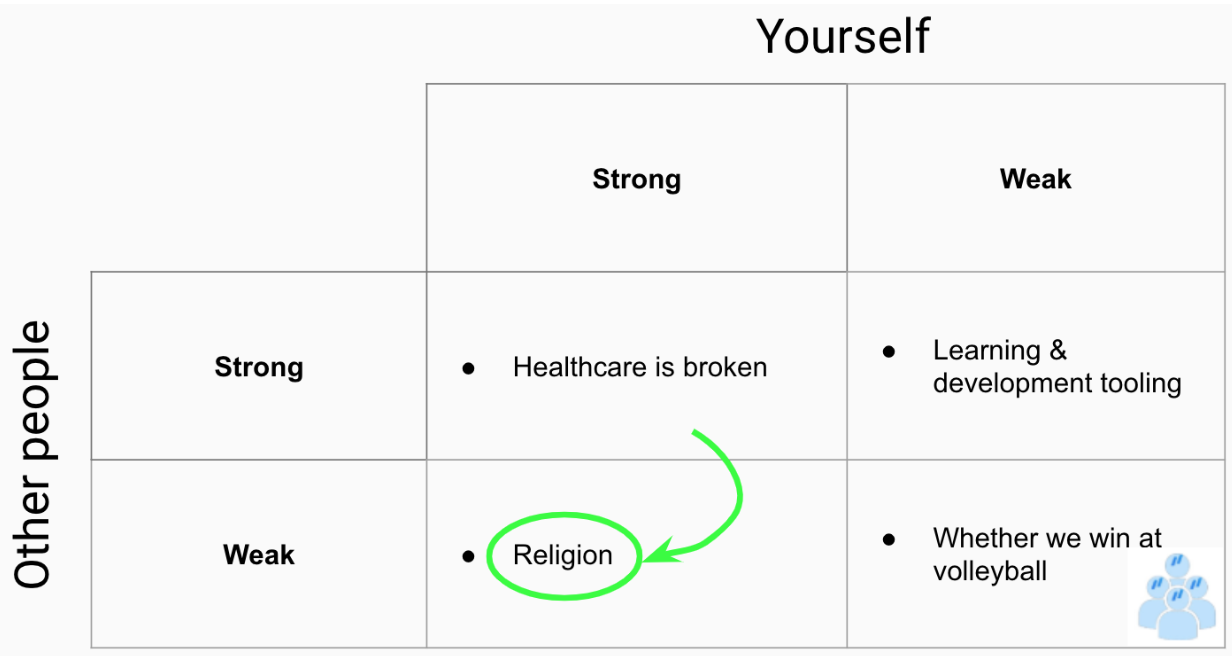kate@goforward.com. Lightly edited transcript of a talk originally presented at a staff all-hands meeting at Forward, October 9, 2019. Opinions mine.
Lots of people at Forward like to express opinions, and one of the things that makes me proud of our culture is the fact that we’ve hired for the sort of people who explore the contours of their beliefs by finding areas of logical consistency and inconsistency rather than the sort of people with the best polish to everything they say. What I don’t want, however, is a habit of provocation and offense, where anyone feels silenced or belittled or excluded. So this is a two sided talk: on one side, I’d like to talk about having real opinions (even controversial ones) and expressing them in an ethical and professional way. On the other side I’d like to talk about hearing opposing opinions in the context of a well-intentioned but superficially abrasive colleague (not naming names :p). The whole rest of my ten minutes presupposes genuine good intentions on both sides. This is not the internet. If you want to go pick a fight at a punk bar later by saying a bunch of stuff you don’t mean, or get whipped into a frenzy because of something intolerable on Facebook, I won’t stop you.
Why am I even qualified to talk about this? For one thing, I have over a decade of professional experience being a pain in the butt, and I don’t think you’ll find a single former manager of mine who disagrees for an instant. I also deeply enjoy being right. If there was a nerd merit badge for outstanding pedantry, I’d have it. But I also have a decreasing number of #^$%s to give, both at work and at home. I’ve survived my share of startups as well as medical and family issues, and it’s not irrelevant that I’m just older and have gotten better at picking my battles. A probable corollary of getting older is that it no longer seems weak or fake to me to take an extra second to be the tiniest fraction kinder or gentler than I would have been a long time ago.
Let’s make a 2x2 matrix where the horizontal axis is how strongly I hold an opinion, that is to say, how deeply I might define myself by a given idea. The vertical axis is how deeply I care about your opinion, that is to say, how important it is to me that we are compatible. If we fill in the quadrants with descriptive statements, we get four possible placements for any new topic.
Let’s try and place a concrete example: which would be the most stressful quadrant to find a topic like “religion” at work? Probably strong-strong. This would manifest as follows: not only have I come to my own position about my flavor of religion/atheism, but I deeply care that you have the same position. Moreover, because faith and belief are so inherently personal, it would be hard to have a talk that didn’t end up as personal rather than principled. Yikes.
(You can also take a more facetious example just to demonstrate that mismatched expectations about intensity of belief can make any situation more stressful: take choosing where to get dinner, where one person “doesn’t care” but strongly wants their dining partner to care in the correct way and it can escalate without warning into an otherwise ungrounded fight.)
Here’s my proposal for a workplace with less strife. Notice that there are still definitely allowed to be entries in the “strong-strong” quadrant. At Forward, we’re here because we strongly believe that healthcare is broken. If you’re at Forward and you don’t believe that healthcare is broken, it’s probably worth raising your voice to have the discussion. There is also room for me to have no opinion whatsoever on some things and just be passively happy that the collective has come to a decision -- nobody has to wade in to every fight. In recent months the choice of knowledge management tool has been the most fraught, and I’m delighted to say that the ops leads are finally happy with their choice (Guru, if you’re interested).
The actionable quadrants here for people who are prone to expressing themselves too abrasively are the bottom two, for both of which you can ask yourself: does it matter? If you’re feeling some bonus wisdom, you can also ask yourself: is it kind? To use the ongoing example of talking about religion at work, are you about to use a bully pulpit to be provocative, to express your “strong opinion weakly held” from a position of authority without letting new people know about the “weakly held” clause? Might they take it personally and not feel equipped to fight on fair ground? You’re being a bully. Tone it down.
On the other side of the scenario, if you’re a person hearing something for the first time, even what feels like a personal attack, it’s still worth taking a moment and deciding if you care. Are you reacting to the presentation or the idea? There’s great power in the deep breath that you take in the face of performative argumentation. If you can calmly fight for an idea in a world where someone else has come in guns blazing, you already have the upper hand. It’s also worth explicitly reminding yourself that intensity of presentation doesn’t necessarily correlate with intensity of feeling -- what this means for you is that if you’re surrounded by argumentative nerds (🙋♀️), sometimes you need to just call them on it.
I will never ever be the person who neuters your opinions. If you still have a strong position, and it’s important to you to make it known and to do your best persuasion, and you’re truly fighting for a principle and not intermingling personal attacks, and you’re honestly doing your best to understand the opposition, then go nuts. Really. Marketplace of ideas. For real. Everyone here is worth giving the benefit of the doubt in terms of having good intentions, and we don’t all have the time or emotional intelligence to shine our thoughts before they come out of our mouths. We just do the best we can.
Thanks.

